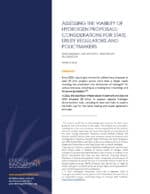Natural gas and electric utilities across the United States are increasingly pursuing pilot projects to blend hydrogen with natural gas for various end-uses, including as a heating fuel in buildings or for power generation. However research shows these projects would increase consumer costs, exacerbate air pollution, and cause safety risks while minimally reducing greenhouse gases. By comparison, electrification is a proven, low-cost alternative that poses no safety or health risks and can rapidly cut building emissions. And in the power sector, increasing renewable electricity is a much more efficient clean energy pathway. State utility regulators and policymakers should require a high burden of proof from utilities to demonstrate the scalability, cost-effectiveness, and environmental justice impacts of any hydrogen proposal.
Assessing The Viability Of Hydrogen Proposals: Considerations For State Utility Regulators And Policymakers
Blending hydrogen with natural gas as a fuel for use in buildings or at gas power plants would increase consumer costs, exacerbate air pollution, and cause safety risks with minimal greenhouse gas reductions. State utility regulators and policymakers should require a high burden of proof from utilities to demonstrate the scalability, cost-effectiveness, and environmental justice impacts of any hydrogen proposal, especially compared to proven decarbonization pathways like electrification.

